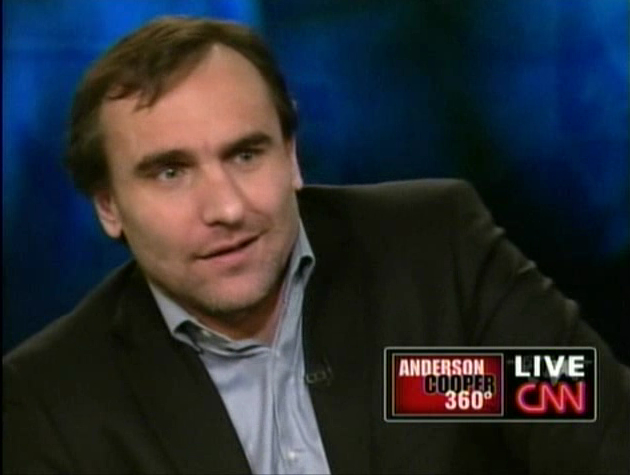AC: "...the profit incentive is so huge that there's nothing to stop them."

Length: 5:08
LARGE (59.7 MB) ----- SMALL (6.3 MB)
Another look at the slaughter going on in Juarez, with some of the same footage we've seen and some new info as well. Afterwards, Michael joins Anderson in the studio to discuss the future.
ANDERSON COOPER: We're back with an exclusive look inside the sophisticated tunnel underneath the San Diego-Tijuana border. A Mexican drug cartel built it. They don't know which one yet.
They and other cartels responsible for dozens of freshly dug graves, as well, all across Mexico every single day. Dozens of murder victims.
Michael Ware saw that firsthand in a single bloody day in Juarez, Mexico, just across the border from El Paso, Texas. First, we want to warn you: his report has some very graphic images.
(BEGIN VIDEOTAPE)
MICHAEL WARE (voice-over): On this day, we're in Juarez to see the horrors for ourselves. It's just before dusk as I approach a fresh crime scene.
(on camera) In Juarez, 1,600 people died from drug-related violence last year. This year the total's already well over 2,000. And today's total is already at 12.
The man in that car was hit by cartel gunmen, riddled with eight bullets. His passenger tried to flee but only made it that far.
(voice-over) This was yet another afternoon of killing in Juarez, with a night of murder yet to follow.
(on camera) It's only 9:00. We're now going and joining this police patrol. Since the killings this afternoon that we saw, there's already been another homicide, bringing today's total to 13.
(voice-over) Every night joint patrols like this one between local and federal police and Mexican soldiers crisscross the city, trying desperately to stem the flow of blood.
(on camera) This patrol has just received a call that something's happened. They're now moving at high speed through these narrow streets to get to the scene as quick as they can. We have no idea what we're about to find.
Turns out it was a report of a robbery. The two men have escaped on foot. The police are still looking for them. But in a town like this, you never know what a call may lead you to.
(voice-over) By now, it's close to 10 p.m., and the reports of violence are streaming in over the police radio.
(on camera) The men with us say sometimes the cartels put in false calls to drag them to other parts of the city while they go and do their business where they're really operating.
(voice-over) But before the night is over, there is even more carnage to come. All this in our one afternoon and evening visit to this deadly city.
(on camera) This time it's almost too much to bear. It's just after 11:00. And where you see those policemen gathered at that door, there's just been four more slayings, this time all women.
The early reports are that a gunman walked in that door and executed all of them, one of them a 12-year-old girl, another one 14. And in a gut-wrenching irony, all of this done with the American border crossing just here, 80 yards away. There can be no more pertinent reminder of the Mexican blood that's being spilt in this war for the right to supply America's demand for illicit drugs.
(END VIDEOTAPE)
COOPER: Michael Ware joins us now.
You know, the Mexican military has now flooded into these towns. It's been -- you know, I think some 45,000 Mexican soldiers all across the country. I mean, unless drug consumption in the U.S. gets reduced, can anything really be done, as long as there's a demand?
WARE: Absolutely not. And that's the thing about this war. I mean, this war rages from U.S. soil all the way down from Colombia.
In Colombia the product is created. It's transshipped through Central America. The banking's done in Panama. It's distributed through Mexico, all of which is driven by America's demand for the drugs. And until that changes, the profit incentive is so huge that there's nothing to stop them.
COOPER: And what the Mexicans are trying to do, the military, the government is hoping to do is to at least break down these large cartels into smaller groups so that it's more of a law enforcement issue and not a threat to national security.
WARE: That's right.
COOPER: They think it's a threat to national security.
WARE: And it is a threat to national security. I mean, some of the building blocks of power, political and certainly on the street within Mexico belong to the cartels. I mean, it's hard for politicians to run seriously for office without some kind of cartel backing. I mean, that's how entrenched they are within Mexican society.
COOPER: Are you surprised? I mean, you spent a lot of time in Iraq. Were you surprised at how violent things were in Juarez?
WARE: Well, it's my second or third trip to Juarez. And it's just getting worse. It's getting absolutely worse. I thought the first trip earlier this year was bad enough. Now they're averaging at least 12 drug-related murders every single day.
COOPER: Amazing.
WARE: There's no sign of it stopping, none.
COOPER: Michael Ware, appreciate it. Great reporting. Thank you very much.
WARE: Thanks, Anderson.
